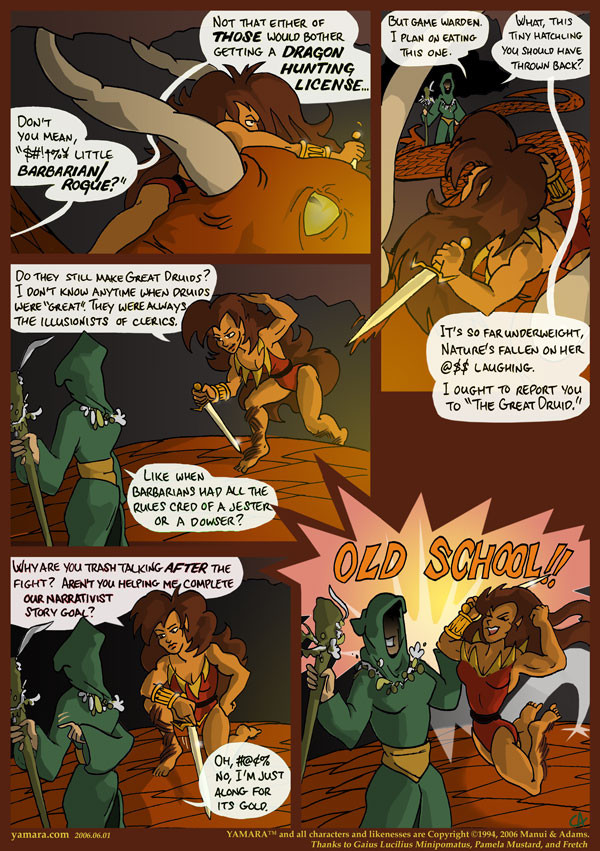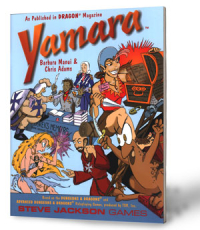The last fight isn’t over until the treasure is divvied up.
There has been a constant effort to improve on roleplaying games since their near accidental inception in the early 1970s. The murder-and-loot metric easily palled on players who actually read some fantasy, and carrying the concept over to modern-day adventures didn’t work so well. If gold and xps tempted some players into metagaming, it reminded others that people have to rise above being mere consumers and rat-racers every day. The common goals were there to strive beyond, and rise above.
Discussion over the nature and method of an art or recreation is always welcome. One extensive discussion related to game design theories took place this decade over at the Forge forums about “GNS Theory” or Gamist/Narrativist/Simulationist Theory. Wikipedia has the lowdown, and we never participated in the discussion ourselves, but it strikes us that dividing gaming into exclusionary categories based on degrees of resembling dramatic performance is missing the answer to an important question. Namely…
Why do you choose the medium of roleplaying games to storytell? One can have a great many authors on a single novel, screenplay, or comic, so sociability isn’t a perfect excuse. The point isn’t simply to be immersed in the action oneself, one wants to be surprised by events. Authors are ultimately unsurprised, because all events are mapped out and finalized by the time the audience receives them (this is widely true even of video game designers). Other people are very good at surprising you, which is why pen-and-paper rpgs remain popular.
Case in point, at a recent Double Exposure convention Chris participated in a Star Trek game, with the interesting twist that it took place in the “mirror universe” during the time of early Earth Imperial expansion. Characters were pre-assigned, and Chris got the role of the Captain’s Man, i.e. the Captain’s chief bodyguard. The GM had lavished a great deal of detail on his scenario, and seemed confidently amused that the Imperial Starfleet assignment was swamped by the corrupt internecine intrigues aboard ship. At one point Chris, in character, took aside into the hall the GM, as ship’s doctor, to inquire after the Captain’s drug habit that he had uncovered. But Chris inquired by asking more generally, “Have there been any unusual doses of controlled substances prescribed or gone missing in the last thirty days?”
The GM went through some motions, even a die roll, and said the doctor found nothing in his records.
Chris acted thwarted. “None at all?”
“None at all.”
Chris wheeled on the GM and mimed grabbing his throat and pulling a phaser. “There’s never none!!” and went into a rage of how there’s always a side trade, and that the doctor must be hiding something very huge, or be very very stupid.
Some heads turned in the hall, but this was a game convention, so no one thought much of it. Except the GM: The look on his face was a pearl without price, a mixture of shock, the doctor’s terror… and his own joy. He may have engineered the overall situation, but I dealt him a surprise beyond playing my role. He was in the midst of the action– where he wanted to be, since he chose a roleplaying game to tell the story– but he was also surprised, something referees are often willing to forego for the entertainment of the other players. But good GMs live to be startled:
It’s fun. It puts them back into the core delight of what gaming uniquely has to offer.
(And the GM had the doctor gush info like a leaky spigot.)
But not all events run on character conflict (i.e. Man vs. Nature). You can’t romance a volcano, or negotiate with robot soldiers. Much of the spice of life, real and imaginary, come from forces beyond ready control, which to the observing character can be best described as chance or fate. And these, too, are very entertaining surprises. If dice or randomizers are introduced to simulate these faceless probabilities, the fault is not in the game design, but in the attitude taken to it by those who choose to play. Perhaps the “munchkin” is not to be faulted so much for his desire to “win” as for his fear of being unprepared, of being surprised.
So watch your favorite movie again, the kabuki will play out, just as it did the time before. Trudge twice through a webcomic’s archive, the same skein rolls out both times. Re-read a Harry Potter novel. The characters kill the characters they killed last time.
Ultimately, in a really good rpg, there can be no spoilers.



Discussion ¬